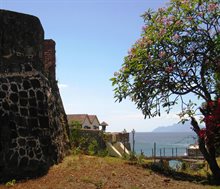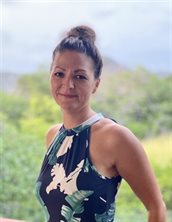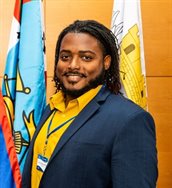Island Voices: interview with Kimani Kitson-Walters and Anna Maitz of St Eustatius
In the Caribbean part of the Kingdom, the effects of climate change are already being felt by people on the islands. It is getting warmer, periods of drought are increasing and when rain falls, much more falls in a shorter period of time. Moreover, hurricanes are becoming more powerful. How should the islands adapt to this? What is happening to prepare the islands and islanders for the future? In the series of interviews ‘Island Voices’, residents from different islands and with different areas of expertise talk about how they view climate change and adaptation.
In this first interview, meet Kimani Kitson-Walters and Anna Maitz. Kimani is policy advisor on Agriculture, Nature and Environment on St Eustatius. Anna programme manager of NEPP (Nature and Environment Policy Plan) on St Eustatius.
Want to know more about climate adaptation in the Caribbean islands? On the knowledge portal you will now also find a section on the Caribbean part of our kingdom.
Why are you concerned with climate adaptation on St Eustatius?
Kimani: “Climate change affects every aspect of our lives: water security, food security, environment and coastal protection. You notice on St Eustatius that the days are getting hotter and there is less rainfall. And when it rains, it is more intense in a shorter time. The water cannot infiltrate into the ground as extensive droughts make it a very hard impenetrable surface. Moreover, the little top soil left is washed away into the sea. This has a detrimental impact on the availability of fertile soil for agriculture and also harms our coral reefs.”
Anna: “Climate change also affects the wellbeing and safety of the residents. St Eustatius is a volcanic island where we depend on rainwater for our water supply. So drought has an immediate negative impact on food security and our drinking water supplies. Drought also leads to less vegetation, reinforcing erosion. In addition, with global warming, it is predicted that hurricanes will intensify. So climate change is affecting our natural environment on land and in the sea.”
Kimani: “Our nature plays a very important role in our economy. As climate change affects our natural environment, it will continue to weaken our economy and subsequently our quality of life.”

What are you currently committed to?
Kimani: “To answer your question from the government’s perspective: we have developed the Nature and Environment Policy Plan (NEPP) which contains several adaptation measures. This plan does not yet address all the challenges, but we are happy to have a plan. And besides, we are already working on a number of projects that can be seen as adaptation, such as coral restoration. Here, we do not transplant individual pieces of coral, but we are aiming to improve the coral reef habitat so that it is suitable for coral larva to settle themselves or for coral outplants at a later stage. For this habitat-restoring approach, we aim to use the black long spined sea urchin. This urchin is an extremely good grazer that eats algae off the reef. If the algae are gone in a certain area, the baby corals can settle and grow there. We are also restoring nature in other ways. Nature provides many services on which we depend.”
Anna: “Within the NEPP, we have several current and upcoming projects to make progress on ensuring the resilience of nature and environment. Within the public entity there are also other parallel projects taking measures to reduce rainwater runoff from flowing into the ocean. We are also reforesting and protecting native species, for instance the bridled quail dove, and the Lesser Antillean iguana. We also have a project to remove free-roaming animals island-wide. Free-roaming animals overgraze the area and contribute to accelerated erosion, deforestation, loss of vegetation, the introduction of invasive species, and loss of topsoil. That in turn contributes to a dryer and warmer climate on the island.”
What do you think St Eustatius needs?
Kimani: “Self-sufficiency. We want St Eustatius to become as self-sufficient as possible. The question is how we can work with nature to be self-sufficient. For example, we want to diversify our agriculture and move away from the conventional practice of monoculture, where only one crop type is grown. This makes the soil more vulnerable and less fertile over time, harming the industry in the long term. That is why we are investigating regenerative forms of agriculture such as syntropic agroforestry which replenishes the soil over time. This produces food of a higher quality and increases biodiversity.”
Anna: “We need to slow down the degradation of nature and become resilient to the effects of climate change. For that, we need a smart approach. St Eustatius has two very different landscapes. The southern end of the island is dominated by a dormant volcano, with dense rainforests in the crater, while the northern hills have drier conditions and savannah-like vegetation and fauna. When major hurricanes (such as Irma in 2017) hit our island, the majority of the tree canopies in the crater were destroyed at varying degrees, with some tree species taking decades to recover. We need to prevent the situation where nature cannot recover. This we can do by ensuring to limit additional stressors to the ecosystem by for instance removing invasive species, and reforesting degraded habitats. More awareness about this is needed, including on the island itself. What St Eustatius has to offer is our nature (both terrestrial and marine) and our rich history and culture. Everywhere you go on the island you stumble upon history and nature. We have several historical sites, ruins and artifcats scattered across the island imbedded in nature. Together, these make up our ‘historic gem’. That is also the nickname of St Eustatius: the ‘historic gem of the Caribbean’.”
Kimani: “We need to work hard to raise awareness. That is why I am organising a nature awareness festival, to highlight climate and nature themes. Nature, environment and climate are not separate issues. They are all interconnected. The trick is to show that: to policymakers, politicians and to residents themselves. A standard presentation often doesn't work, which is why we combine education with entertainment.”
What do you expect from the Netherlands?
Anna: “We have a lot of good contacts with policy officers and other officials in the ministries. And that is very good for St Eustatius. They understand that we have limited capacity and they assist us with that. Also, as a small island, we can make use of their large networks of universities, knowledge institutions, and consultancies if needed.”
Kimani: “We have received a lot of support from the Dutch government, for instance in drafting and implementing the NEPP. But also in the development and construction of solar panels for clean energy. We are very happy with that. Furthermore, its commitment to the International Panel on Deltas, Coastal Areas and Islands (IPDC) shows that the government is aware of the challenges we face as a special municipality of three thousand inhabitants and wants to offer help. The Dutch government is already working on adaptation in many areas. We look forward to working together, including through the IPDC, to address the challenges we face on St Eustatius.”
Can you name any challenges you face as a special municipality?
Kimani: “One of the challenges is that we get funding for about three or four years. But without long-term structural funding, it is difficult to build enough capacity or to ensure that some projects become structural, which is vital. It just takes a long time because we usually have to attract people from outside. If the funding then stops after a few years, we have a problem. Then we have to start the process all over again. Climate adaptation is of course a long-term challenge and for that you need long-term structural funding.”
What do you want to leave to future generations?
Kimani: “A sustainable natural system that my children and grandchildren will not take for granted, but appreciate and respect. And I hope they will understand that the work we do does not stop. They need to remain aware of the changes that are coming. We are doing our utmost to ensure that they have a future and a safe environment. That they have everything they need for that. That is what every parent wants for their child.”
Anna: “It is important to remember that it does not have to be all doom and gloom with the climate. In fact, it is not too late to take action. A lot will probably change because of climate change, but we will continue to work for a sustainable environment. We should not be discouraged by setbacks, but rather celebrate the successes and use those successes for even more successes!”
About Kimani Kitson-Walters
Kimani Kitson-Walters, a Jamaican native, is a passionate nature lover with a strong background in marine ecology and fisheries management which he gained from the University of the West Indies, Mona Campus while reading for his bachelors and PhD. Throughout his 12 year career, he has gained extensive experience as an environmental consultant and researcher in the public and private sector contributing to several projects throughout the Caribbean. It is his strong belief that the advancement of St Eustatius’s economy is dependent on sustainable adaptive development with nature.
About Anna Maitz
Anna Maitz has been serving as the Program Manager for the Nature Environmental Program at the Public Entity of St Eustatius since 2022. With a background in Biology and Ethology, her professional journey has mainly revolved around marine environments and education before joining the public sector. Living on the island since 2010 has afforded her a deep understanding of both terrestrial and marine ecosystems. Over the years, she has built a network extending across the Caribbean, connecting with various stakeholders such as NGOs, policymakers, academics, and governmental ministries. This network has been instrumental in fostering collaborations aimed at conserving our natural resources.

Anna Maitz

Kimani Kitson-Walters